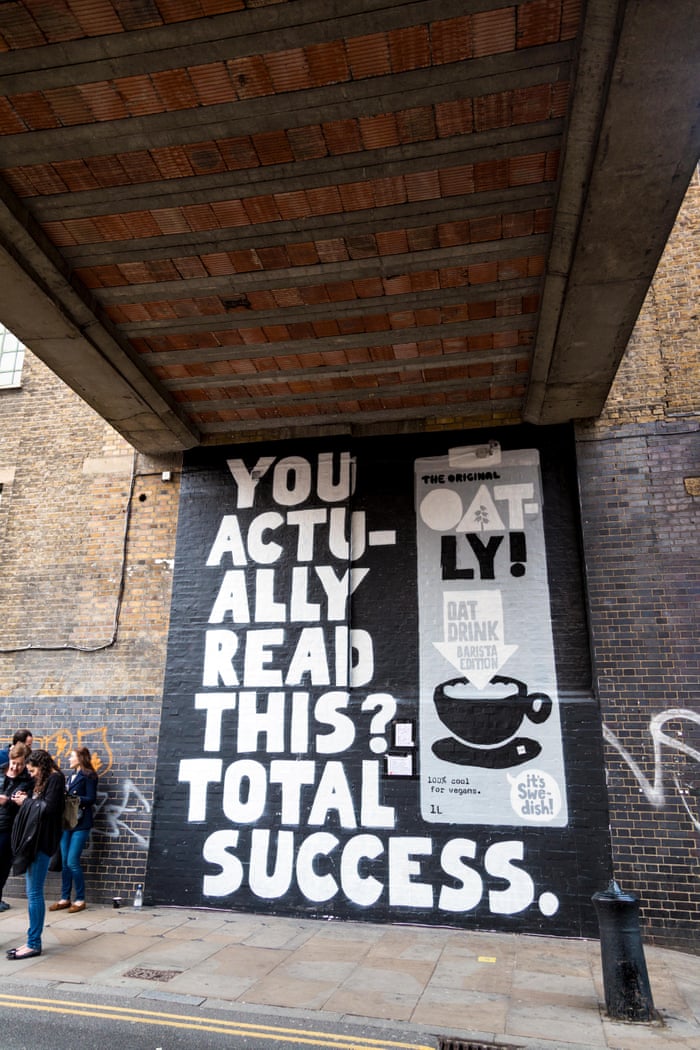Oatly has had a series of adverts pulled in the UK after the advertising watchdog ruled that they are misleading.
A total of five adverts have been banned: paid-for posts on Facebook and Twitter, two newspaper adverts and two TV adverts.
The banned adverts made various claims about the superiority of the brand’s environmental credentials vis-a-vis the traditional agriculture.
One of the claims was that “Oatly generates 73 per cent less CO2e (carbon dioxide equivalent) vs milk, calculated from grower to grocer”.

Oatly adverts: banned for misleading claims
Oatly has pioneered shame-based advertising for its plant-based products
The adverts also claimed that “the dairy and meat industries emit more CO2e than the world’s planes, trains, cars, boats combined”, and that “25 per cent of the world’s greenhouse gases are generated by the food industry, and meat and dairy account for more than half of that”.
One of the adverts, which featured in a national newspaper, claimed that “if everyone in the world adopted a vegan diet, it would reduce food’s annual greenhouse emissions by 6.6 billion metric tons (a four per cent reduction)”.
The Advertising Standards Agency (ASA) began investigating the claims after receiving more than 109 complaints, including one from campaign group A Greener World, which said that they were misleading.
In its defence, Oatly said it had received its figures from product lifecycle experts at CarbonCloud, which calculated the “carbon footprint” of its Barista Edition oat drink “from cradle to store” and compared it to the emissions of whole cow’s milk.
In response, the ASA said consumers would assume the claim, “73 per cent less CO2e vs milk”, means that all Oatly products generate 73 per cent less CO2e compared with any type of cows’ milk.
As a result, the ASA concluded that the two adverts that included the claim were “misleading”.
Additionally, the ASA impugned Oatly’s claim that meat and dairy accounts for over half of the greenhouse gases generated by the food industry, saying that it was too narrow a definition and could mislead customers.
Want to get people to eat more plant-based foods? Give them new choice, says revealing new study
What!? You mean you don’t want to eat these shriveled plant-based “sausages”!?
A new study suggests that the best way to get people to go plant-based is to give them little to no choice in the matter. Seriously.
The study, out of the University of Westminster, reports that meat-eaters are much more likely to choose a plant-based meal if most of the options they have to choose from are plant-based. Study authors conclude that menus which are at least three-quarters vegetarian have the best chance of converting a carnivore.
These findings chime with other recent research which has showed that only social pressure, not health or taste claims, is really effective in getting people to choose plant-based alternatives, and with changing attitudes from governments, such as that of the UK, which are quickly coming round to the notion of giving people no choice whether to go plant-based.
Click here to read more about this revealing study
The regulator concluded that consumers would interpret Oatly’s claim that “climate experts say cutting dairy and meat products from our diets is the single biggest lifestyle change we can make to reduce our environmental impact” as “based on scientific consensus”, when it was actually just the opinion of one climate expert.
“We told Oatly UK to ensure that the basis of any environmental claim was made clear, including what parts of the lifecycle had been included and which excluded,” the ASA said.
“We also told them to ensure they held adequate evidence to substantiate environmental claims made in their ads as they would be understood by consumers.”
Tim Knight, a spokesperson for Oatly told The Independent: “It’s clear that we could have been more specific in the way we described some of the scientific data. For example, we made a claim stating that ‘Oatly generates 73 per cent less CO2e VS cows milk’. We should have been more specific and said: ‘Oatly Barista Edition oat drink generates 73 per cent less CO2e vs. whole milk, calculated from grower to grocer’.
“We’re a science-based company and take pride in being precise, but we could have been clearer. We talk about these things a lot, because we want to make it easy for people to make an informed switch from dairy to oat drink.”


Don’t hesitate to email us at [email protected] for personalized coaching and a client questionnaire if you’d like DEDICATED tailor-made personal training on strength training, building muscle, losing fat, developing athleticism, and more — all to your liking, lifestyle, habits, and taste!
Otherwise, don’t forget to claim your FREE eBook detailing how to lose 20lb of fat while building muscle in 12 weeks! You can claim it here.
Alternatively, you can pick up a FREE eBook on fundamental strength principles offering an introductory workout program.











